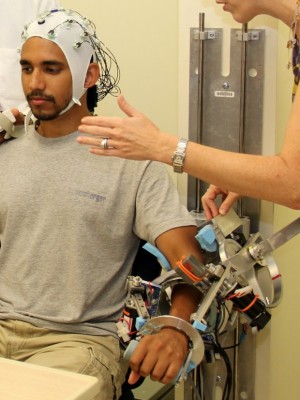$1.17 Million Grant For Designing A BMI System For Stroke Survivors

Researchers from the Rice University, the University of Houston (UH) and TIRR Memorial Hermann have received a $1.17 million grant from the National Institutes of Health (NIH) and the President’s National Robotics Initiative (NRI) for the project aimed at designing a BMI system for stroke survivors. Scientists will develop and validate a noninvasive brain-machine interface (BMI) to a robotic orthotic device to innovate upper-limb rehabilitation. The new neurotechnology will interpret brainwaves that let a stroke patient willingly operate an exoskeleton that wraps around the arm from the fingertips to the elbow. The robotic system will be tested on 40 patients over the next two years. The team led by José Luis Contreras-Vidal, director of UH’s Laboratory for Noninvasive Brain-Machine Interface Systems, has already reconstructed 3-D hand and walking movements from brain signals recorded in a noninvasive way using an EEG brain cap. The technology allows users to control robotic legs with their thoughts and below-elbow amputees to control neuroprosthetic limbs. Brain wave reading robot might help stroke survivors. Initially, EEG devices will translate brain waves from healthy subjects into control outputs to operate the MAHI-EXO II robot, and then from stroke survivors who have some ability to initiate movements, to prompt the robot into action.
Via:roboticsbusinessreview.com
| Tweet |











